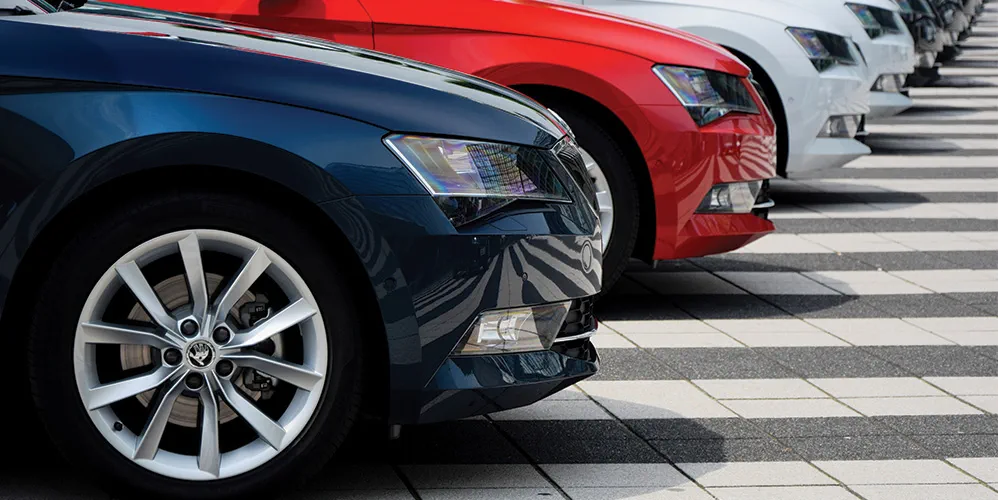
Automobile Commerce
10 मार्च 2021

Dear Reader,
The auto industry has been facing the heat to move digital more than ever as the pandemic has brought upon new challenges and deepened the need to shift toward digital solutions. Auto dealers have been slow to adopt digital car-buying solutions, but with lockdowns closing dealership doors, the pandemic accelerated the shift to omni-channel auto retail.
Online car buying has taken off in a big way during the pandemic. According to Publicis Sapient, many digitally enabled OEMs are seeing increased, higher quality leads that are 30 percent more likely to buy and a two to four-fold surge in website traffic compared with pre-COVID-19. These online tools are, in some instances, responsible for more than 20 percent of new leads during the second quarter of 2020.
More recently, a number of digitally focused disruptors such as Carvana, Carmax and Tesla have entered the market, offering unique, omni-channel experiences like flexible return policies, virtual auctions, home deliveries, online negotiation and virtual trade-in valuations. These digital leaders recognized a shift in customer expectations and focused on creating seamless user experiences across the entire shopping journey.
Online used car seller Vroom noticed a considerable growth in demand as a result of the pandemic, with people turning to digital methods for purchasing cars. Similar to its competitor Carvana, Vroom offers no-haggle pricing and a no-questions-asked return policy. Another Used car marketplace Shift Technologies went public via SPAC in October 2020. Shift allows users to buy, sell and finance cars online. The company offers a "buy it now" option that allows a buyer to purchase a vehicle online without a test drive. Similarly, Cazoo, a UK based company, sells refurbished cars online, delivers them to customers' homes within 48 hours, and offers a seven-day free returns policy.
Then there are digital platforms that help the dealerships move their businesses online. Take for example, Modal which makes software for car dealerships to move the entire buying process online. Another company, Digital Motors builds a car-buying platform for auto retailers, dealerships, brands and manufacturers.
The new car ownership model of subscription offers ease and convenience to customers like never before. Switzerland-based Carvolution offers car subscriptions where Customers pay a monthly price for a vehicle and are free to switch cars as they like.
We believe that, the winners in this industry will be defined by how quickly they adapt to technological innovations. The dealers and OEMs who adjust can thrive, while those reluctant to change will fall further behind.
Credits : Akhil Handa,Aparna Anand
Popular Articles
Related Articles










-
Disclaimer
The contents of this article/infographic/picture/video are meant solely for information purposes and do not necessarily reflect the views of Bank of Baroda. The contents are generic in nature and for informational purposes only. It is not a substitute for specific advice in your own circumstances. Bank of Baroda and/ or its Affiliates and its subsidiaries make no representation as to the accuracy; completeness or reliability of any information contained herein or otherwise provided and hereby disclaim any liability with regard to the same. The information is subject to updation, completion, revision, verification and amendment and the same may change materially. The information is not intended for distribution or use by any person in any jurisdiction where such distribution or use would be contrary to law or regulation or would subject Bank of Baroda or its affiliates to any licensing or registration requirements. Bank of Baroda shall not be responsible for any direct/indirect loss or liability incurred by the reader for taking any financial decisions based on the contents and information mentioned. Please consult your financial advisor before making any financial decision.
Automated Driving
Dear Reader,
Automated driving normally refers to self-driving vehicles or transport systems that move without the intervention of a human driver. These features generally fall into logical groups based on how they combine acceleration, braking and steering. Autonomous vehicle market is projected to surpass US$ 65 billion by 2027 with companies such as Tesla, Autoliv Inc. being the key players.
Drivers need to be able to process a great deal of information as it is a skill that must be learned – this not only applies to people but is also true for automated and autonomous vehicles. In order for driverless cars to react correctly and safely in all situations, they require artificial intelligence and an electronic “brain” that must possess immense computing power.
With the new generation of its AI-capable control unit, ZF ProAI, has developed advanced driver assistance systems (ADAS) which rely on cameras and radars. Companies like Waymo are working on the next stage: autonomous driving. When cars can drive themselves, human error – statistically the most likely cause of accidents – will no longer be an issue.
Today, cars are being developed with cognitive abilities similar to that of a human brain so that they can make decisions which are not included in their code. In a fraction of a millisecond, self-driving cars must be able to process 360-degree view of the environment, interpret this information, verify the position of the vehicle itself, track the position of any sources of danger, calculate and carry out driving manoeuvres. Thus making, Vision Zero - the goal of ending motoring accidents a reality.
Chinese car sharing operator Pand Auto is already testing automated cars in Beijing. The Chinese government is supporting the construction of large test sites and has opened the first test center for autonomous vehicles in Beijing, creating what is literally a driving school for autonomous vehicles.
The trend toward automation is not just limited to passenger cars. Companies like ZF Friedrichshafen have long been working on self-driving mass transit and cargo movers, automated commercial vehicles, parcel delivery services, intelligent forklift trucks and innovative agricultural machinery.
On the other hand, Amazon is planning to put 100,000 electric delivery vehicles on the road by 2030, with deliveries starting as soon as 2021. They plan to buy these vehicles from Rivian, an electric automaker in which Amazon has invested $440M. Similarly, Microsoft is joining forces with Cruise, the self-driving subsidiary of General Motors, to help speed up the commercialization of autonomous vehicles. Looking at the potential possibilities, we can safely conclude that self-driving cars on roads don’t seem to be a distant dream.
Credits : Akhil Handa,Clint James
Beauty Trends - 2021
Dear Reader,
The global beauty industry (encompassing skin care, color cosmetics, hair care, fragrances, and personal care) has been shaken by the COVID-19 crisis. With months of lockdown, retail businesses closed and international travel ban, consumer’s purchase and usage behaviour has witnessed a dramatic change leading to fall in sales across many beauty segments.
Beauty sales declined as much as 30% in the first half of the year, according to a McKinsey report and even major brands took a blow. With more than a year under pandemic, brands are now working towards better ways to deal with the humongous shift in consumer values and expectations.
In this effort, brands are adopting new technologies at a faster speed to redefine personalisation. Some companies such as L’Oréal offers AI powered at-home devices, which can measure user conditions, like the emergence of dark spots or surrounding environmental concerns, on a daily basis. L’Oréal’s Perso device accounts for this data to dispense custom-formulated makeup every day. Another company Atolla uses AI capabilities to customize facial serums for consumers by using data collected through quizzes and tests measuring oil, moisture, and pH levels.
As per a CB Insights report, Johnson & Johnson, has invested in new engineered preservatives that could be used in items like haircare or body care products. The company invested in Curie Co, a startup that makes biomaterials to replace preservatives in everyday beauty and personal care products, through its JLABS incubator.
Another apparent trend is BigTechs offering retail channel for beauty products. Amazon launched a private label beauty brand called Belei in 2019 and recently invested in India-based D2C beauty site MyGlamm. China-based tech giant Alibaba offers livestreaming and AR features which it has used to attract luxury beauty brands to its e-commerce platform.
Virtual try-on tech leverages augmented reality to allow shoppers to test how different beauty products will look without actual trial. Remarkably, virtual try-on can also help brands personalize the beauty shopping experience, enhancing product discovery and making tailored recommendations about foundation shades, skincare products, and more.
In December 2020, Google launched an AR-powered cosmetics try on tool in Google Search, partnering with brands like L’Oréal, Estée Lauder, MAC Cosmetics, and more to let users try on searched-for makeup products using front-facing mobile phone cameras.
Going forward, we expect to see beauty brands and tech giants alike turn to virtual try-on to gather shopper data and make more personalized product recommendations.
Credits : Akhil Handa Aparna Anand


Leave a Comment
Thanks for submitting your details.